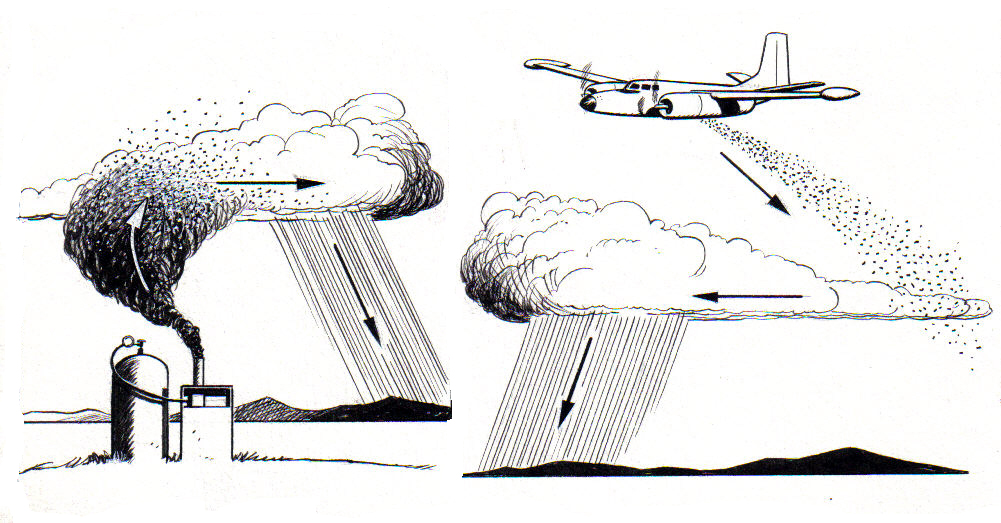The skies above Israel have long been a laboratory for human ambition to circumvent the Creator’s prescription for ample rains. From early attempts to coax rain from clouds, to the cutting edge of climate intervention, this tiny country, acutely aware of water scarcity, has been a key player in the evolving story of weather modification.
Yet, this far-reaching pursuit is often shrouded in public skepticism and complex debates, making it crucial to separate established facts from speculative claims.
Cloud Seeding: An Experiment with a Sobering Conclusion
For decades, Israel was a pioneer in cloud seeding, a localized form of weather modification designed to enhance precipitation. The technique involves introducing particles like silver iodide into clouds to encourage rainfall. Israel’s journey began in 1961, driven by the hypothesis that cold winter clouds common in the region would respond to these artificial ice nuclei.
Early experiments, Israel I and Israel II, were initially deemed successful, fostering optimism for the technology. However, over time, more rigorous studies began to challenge these initial perceptions. By the mid-1990s, research suggested that Israeli clouds naturally contained high concentrations of ice crystals, potentially limiting the impact of additional seeding. A 1995 analysis estimated only a modest 6% increase in precipitation in the Galilee Mountains.

The most definitive results came from a comprehensive reassessment in 2010 by Tel Aviv University, which analyzed fifty years of data and concluded that cloud seeding “seems to have little if any impact on the amount of precipitation,” attributing previous increases to natural weather patterns. This was further reinforced by Israel 4, a randomized experiment conducted from 2013 to 2020. It was halted early due to disappointing findings: a statistically insignificant 1.8% increase in rainfall.
These outcomes led the Israel Water Authority to make a significant decision: to indefinitely discontinue its long-standing operational cloud seeding program. Israel’s experience underscores the inherent difficulty in isolating human impacts from natural meteorological variability and highlights the need for responsible designs in evaluating such technologies. This decision by a nation with decades of experience in cloud seeding carries substantial implications, prompting a re-evaluation of its practical utility and cost-effectiveness for other countries facing water scarcity.
From Rainmaking to Sun-Blocking: A New Hubris in the Sky
While traditional cloud seeding programs in Israel have concluded, a new, more ambitious form of weather modification is emerging within the country’s technological landscape: solar geoengineering. At the forefront is Stardust Solutions, a US-Israeli startup founded in 2023. Based in Israel, the company aims to “stop global warming in the short term” by blocking solar radiation from reaching Earth.
Stardust Solutions proposes Stratospheric Aerosol Injection (SAI), a method involving injecting reflective particles into the upper atmosphere to scatter sunlight back into space. They claim their proprietary, non-sulfate aerosols offer advantages over traditional sulfates. The company has announced plans for “contained, non-dispersive” outdoor tests in Israel and has already conducted “outdoor aerial checks” of their dispersal system, though actual aerosol scattering has reportedly not yet occurred.
Financially backed by AWZ, an Israeli-Canadian venture capital firm with a partnership with the Israeli Ministry of Defense’s Directorate of Defence Research and Development (DDR&D), Stardust Solutions’ activities raise complex questions. While there is no public evidence of the Defense Ministry conducting geoengineering research, the financial link suggests interest in technologies with significant strategic implications.
This shift from state-led cloud seeding to privately-driven, climate-focused geoengineering sparks considerable debate. Critics, including the Center for International Environmental Law (CIEL), view Stardust’s commercialization plans as a “reckless gamble” and a likely violation of the de facto moratorium on geoengineering established by the Convention on Biological Diversity (CBD), to which Israel is a party. CIEL emphasizes that solar geoengineering is “inherently unpredictable” and risks “breaking further an already broken climate system”. Concerns also exist about the potential for “deliberately polluting the atmosphere over hundreds of years,” imposing an “unacceptable burden on future generations,” and the risk of control by a few major powers and corporations. Furthermore, proper testing of solar geoengineering at a meaningful scale is considered impossible without large-scale deployment, making it an “irresponsible gamble” that could jeopardize the very lives, let alone human rights, of billions.
Beyond Israel: A Global History of Atmospheric Manipulation
Weather modification is not unique to Israel; over 50 countries are currently engaged in some form of these operations. Key nations include:
- United States: Employing cloud seeding in mountainous areas since the 1950s to increase snowpack and water supply.
- China: A significant user, with plans to modify weather over half its territory by 2025, using it for rainfall enhancement and air quality improvement.
- United Arab Emirates (UAE): Actively engaged in cloud seeding since the 2000s to increase rainfall.
- India and Russia: Also listed among nations utilizing cloud seeding.
- Thailand: The Royal Rainmaking Project, active since 1969, aims to alleviate drought.
- European Countries: France and Spain are noted for their cloud seeding activities.
The objectives vary, primarily focusing on increasing precipitation, hail suppression, fog dispersal, and even controlling weather for specific events like the Beijing Olympic Games.
The history of weather modification also includes a complex past of military interest and covert operations, which have significantly shaped public perception and distrust.
Key Declassified Projects:
- Project Cirrus (US, 1947-1952): Early efforts to modify weather, including seeding hurricanes. A public claim of success by the project head fueled public mistrust.
- Operation Popeye (US, 1967-1972): A highly classified US military program to prolong the monsoon season in Southeast Asia to disrupt enemy logistics along the Ho Chi Minh Trail. US officials initially denied the program, contributing to public suspicion before its declassification in 1974.
- Project Stormfury (US, 1962-1983): Aimed to weaken tropical cyclones by seeding the eyewall with silver iodide, undertaken with greater discretion after the Cirrus controversy.
- US Secret Cloud Seeding in Cuba (1969-1970): The US secretly used cloud seeding to disrupt the Cuban sugar crop, causing erratic weather and harvest shortfalls.
These historical projects, particularly the secrecy surrounding Operation Popeye, created a legitimate basis for public suspicion about government activities in the atmosphere. Public demand for transparency and accountability in any weather modification or geoengineering activities is a valid concern, rooted in the historical precedent of government secrecy and the inherent uncertainties of atmospheric manipulation.
Israel at a Totalitarian Crossroads
Experimentation in weather modification and geoengineering necessitates a rigorous examination of their potential public health and ethical implications. Large-scale solar geoengineering, such as SAI, carries significant potential risks.
Direct human health impacts could include increased mortality from air pollution and ozone loss, potentially leading to higher rates of skin cancers, with continuous, prolonged exposure likely resulting in chronic health effects. Indirect impacts could include accelerated ecosystem collapse, species extinction, and disruption of vital ecosystem functions.
Even with cloud seeding, despite decades of use, there remains limited knowledge on the overall human health impacts, with concerns about the long-term environmental and human health effects of continuous silver iodide exposure remaining uncertain. The imperative for transparency, public participation, and Free, Prior, and Informed Consent (FPIC) is paramount.
Existing international legal frameworks, such as the Environmental Modification Convention (ENMOD) of 1977, prohibit hostile use of environmental modification techniques with “widespread, long-lasting or severe effects”. However, the Convention on Biological Diversity (CBD) issued a de facto moratorium on geoengineering in 2010, reaffirmed in 2023, due to its potential implications for biodiversity, rooted in the precautionary principle.
The emergence of private entities like Stardust Solutions, pursuing planetary-scale interventions with commercial aims, exposes a critical flaw in global environmental ideology. The reckless race to commercialize geoengineering, from cloud seeding to the nascent field of solar geoengineering, reveals a persistent human inclination to assert control over natural phenomena.
Wisdom, Not Technological Placebos for the Atmosphere
However, Israel’s own experience with cloud seeding, culminating in the discontinuation of a long-standing program due to negligible impact, offers a profound lesson. This sobering conclusion, echoed by the broader scientific community’s caution regarding large-scale climate interventions, calls into question the very premise of relying on technological placebos for the atmosphere.
In the face of these reckless and often unproven endeavors, perhaps a different path, rooted in wisdom, offers a more sustainable solution. As Deuteronomy 11:13-14 promises, “If you hearken diligently to My commandments which I command you this day, to love the L-rd your G-d, and to serve Him with all your heart and with all your soul, then I will give the rain of your land in its season, the early rain and the latter rain, that you may gather in your grain, and your wine, and your oil.” This timeless verse suggests that true abundance and environmental harmony may not lie in human innovation to manipulate the skies, but rather in a deeper reverence for the Creator and adherence to His ways, recognizing His personal dominion over the heavens and the bounty they bestow.





